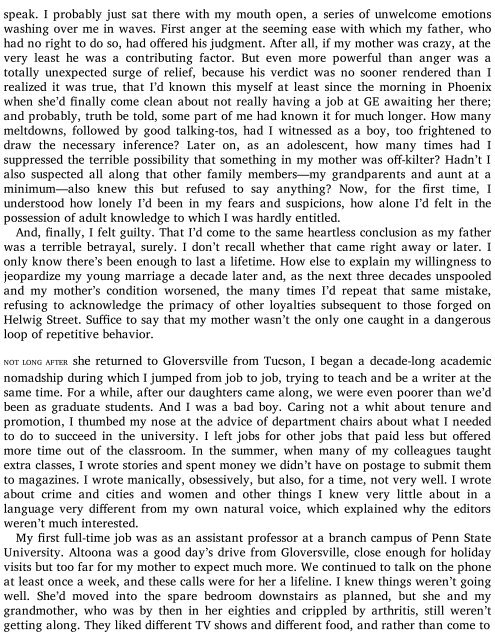8956825209375
Create successful ePaper yourself
Turn your PDF publications into a flip-book with our unique Google optimized e-Paper software.
speak. I probably just sat there with my mouth open, a series of unwelcome emotions<br />
washing over me in waves. First anger at the seeming ease with which my father, who<br />
had no right to do so, had oered his judgment. After all, if my mother was crazy, at the<br />
very least he was a contributing factor. But even more powerful than anger was a<br />
totally unexpected surge of relief, because his verdict was no sooner rendered than I<br />
realized it was true, that I’d known this myself at least since the morning in Phoenix<br />
when she’d nally come clean about not really having a job at GE awaiting her there;<br />
and probably, truth be told, some part of me had known it for much longer. How many<br />
meltdowns, followed by good talking-tos, had I witnessed as a boy, too frightened to<br />
draw the necessary inference? Later on, as an adolescent, how many times had I<br />
suppressed the terrible possibility that something in my mother was o-kilter? Hadn’t I<br />
also suspected all along that other family members—my grandparents and aunt at a<br />
minimum—also knew this but refused to say anything? Now, for the rst time, I<br />
understood how lonely I’d been in my fears and suspicions, how alone I’d felt in the<br />
possession of adult knowledge to which I was hardly entitled.<br />
And, nally, I felt guilty. That I’d come to the same heartless conclusion as my father<br />
was a terrible betrayal, surely. I don’t recall whether that came right away or later. I<br />
only know there’s been enough to last a lifetime. How else to explain my willingness to<br />
jeopardize my young marriage a decade later and, as the next three decades unspooled<br />
and my mother’s condition worsened, the many times I’d repeat that same mistake,<br />
refusing to acknowledge the primacy of other loyalties subsequent to those forged on<br />
Helwig Street. Suce to say that my mother wasn’t the only one caught in a dangerous<br />
loop of repetitive behavior.<br />
NOT LONG AFTER she returned to Gloversville from Tucson, I began a decade-long academic<br />
nomadship during which I jumped from job to job, trying to teach and be a writer at the<br />
same time. For a while, after our daughters came along, we were even poorer than we’d<br />
been as graduate students. And I was a bad boy. Caring not a whit about tenure and<br />
promotion, I thumbed my nose at the advice of department chairs about what I needed<br />
to do to succeed in the university. I left jobs for other jobs that paid less but oered<br />
more time out of the classroom. In the summer, when many of my colleagues taught<br />
extra classes, I wrote stories and spent money we didn’t have on postage to submit them<br />
to magazines. I wrote manically, obsessively, but also, for a time, not very well. I wrote<br />
about crime and cities and women and other things I knew very little about in a<br />
language very dierent from my own natural voice, which explained why the editors<br />
weren’t much interested.<br />
My rst full-time job was as an assistant professor at a branch campus of Penn State<br />
University. Altoona was a good day’s drive from Gloversville, close enough for holiday<br />
visits but too far for my mother to expect much more. We continued to talk on the phone<br />
at least once a week, and these calls were for her a lifeline. I knew things weren’t going<br />
well. She’d moved into the spare bedroom downstairs as planned, but she and my<br />
grandmother, who was by then in her eighties and crippled by arthritis, still weren’t<br />
getting along. They liked dierent TV shows and dierent food, and rather than come to

















